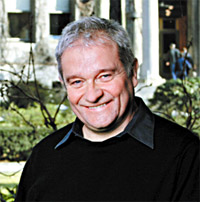Discovering Cyclin-Dependent Kinase, a Billion Year Old Regulator of Cell Division
Eukaryotic cells—cells that house their genetic material in a nucleus—reproduce by dividing. To prepare for this event, a cell first grows in size, then duplicates its chromosomes and separates the chromosomes so they can be distributed equally between two daughter cells. In experiments carried out in the 1970s and 1980s, Paul Nurse (1949 - ) discovered the molecule cyclin-dependent kinase, which interacts with other molecules called cyclins to propel a cell through the phases of this cell cycle in an orderly sequence. For revealing the molecular underpinnings of this fundamental biological process, Nurse received the Nobel Prize in 2001, shared with Leland H. Hartwell and Tim Hunt. Nurse became president of The Rockefeller University in 2003.

Nurse, Paul
Nurse's research has implications for understanding cell reproduction, growth, and development, as well as what goes awry in the cell cycle when cells divide out of control, leading to cancer. Expanding on these findings, other researchers have developed agents that inhibit CDK and that are in clinical trials as potential cancer treatments.
Nurse used genetic methods to study the cell cycle in fission yeast (Schizosaccharomyces pombe), a distant relative of baker's yeast (Saccharomyces cerevisiae). In fission yeast, mitosis and cell division normally occurs when the cell grows to a fixed size. The chance discovery of a mutant that divided at a reduced size gave Nurse and colleagues an entering wedge to discovering genes that control mitosis. Soon after, they found that one of these genes, the cyclin-dependent kinase cdc2, also is needed for the cell to begin duplicating its chromosomes, the segment of the cell cycle known as S phase. Nurse's laboratory then developed molecular methods to clone and characterize the yeast for cdc2. In 1987 Nurse and colleagues isolated the human gene that corresponds to cdc2, and showed that it could function in yeast, proving that over a billion years of evolution the function of this protein in the cell cycle has been conserved.
Nurse's laboratory today focuses on the molecular machineries that control cell division and cell shape, continuing to use S. pombe as a model system. Research on the cell cycle has focused on controls acting over S phase. The Nurse lab also is investigating the nutritional and cell size controls that operate over mitosis. In addition, recent genomic studies have generated a resource whereby every gene in the fission yeast genome has been individually deleted. The Nurse lab is using this resource to characterize all the genes necessary for cell viability and for various cell functions, including progression through the cell cycle and generation of cell form, cell size, and nuclear shape and size.
Paul Nurse graduated from Birmingham University (United Kingdom, 1970) and received a PhD from the University of East Anglia (1973). He did postdoctoral work at universities in Bern, Edinburgh, and Sussex, and joined the Imperial Cancer Research Fund (ICRF) in London in 1984. In 1988 he moved to the University of Oxford as chair of its department of microbiology, and he returned to ICRF in 1993 as director of research. He became director general in 1996 and in 2002 was appointed chief executive of Cancer Research UK, formed when ICRF merged with the Cancer Research Campaign. He moved his laboratory to the United States upon being named president of Rockefeller University in 2003. He also is director of the Anderson Center for Cancer Research at Rockefeller. Nurse is a member of The Royal Society and a foreign associate of the U.S. National Academy of Sciences (1995). He was elected a foreign honorary member of the American Academy of Arts and Sciences (2006). In addition to the Nobel Prize in Physiology or Medicine (2001), his achievements have been recognized with the Lasker Award (1998), The Royal Society's Royal and Copley Medals (2002), and the Legion of Honor (2002). In 1999 he was honored with knighthood in Great Britain for services in cancer research and cell biology, and since 2000 he has been a member of the Council for Science and Technology advising the UK Prime Minister on science and technology.
Selected Publications
Nurse P. Genetic control of cell size at cell division in yeast. Nature, 1975, 256: 547-551
Nurse P and Thuriaux P. Regulatory genes controlling mitosis in the fission yeast Schizosaccharomyces pombe. Genetics, 1980, 96: 627-637
Beach D, Durkacz B, and Nurse P. Functionally homologous cell cycle control genes in fission yeast and budding yeast. Nature, 1982, 327: 31-35
Russell P and Nurse P. cdc25+ functions as an inducer in the mitotic control of fission yeast. Cell, 1986, 45: 145-153
Lee MG and Nurse P. Complementation used to clone a human homologue of the fission yeast cell cycle control gene cdc2. Nature, 1987, 327: 31-35
Enoch T and Nurse P. Mutation of fission yeast cell cycle control genes abolishes dependence of mitosis on DNA replication. Cell, 1990, 60: 665-673
Hayles J, Fisher D, Woollard A, and Nurse P. Temporal order of S-phase and mitosis in fission yeast is determined by the state of the p34cdc2/mitotic B cyclin complex. Cell, 1994, 78: 813-822
Further Reading
Nurse P. A long twentieth century of the cell cycle and beyond. Cell, 2000, 100: 71-78
http://download.cell.com/pdf/PIIS0092867400816840.pdf
Nurse P. Life, logic and information. Nature, 2008, 454: 424-426
Links
Paul Nurse, Laboratory of Yeast Genetics and Cell Biology
http://www.rockefeller.edu/research/abstract.php?id=316
The Nobel Prize in Physiology or Medicine, 2001
http://nobelprize.org/nobel_prizes/medicine/laureates/2001/index.html
The cell cycle and beyond: An interview with Paul Nurse. Disease Models & Mechanisms, 2009, 2: 113-114
http://dmm.biologists.org/content/2/3-4/113.full.pdf+html?sid=a824c047-7608-4700-99d0-5d0feeeb688f
Charlie Rose Interviews Paul Nurse
http://www.charlierose.com/guest/view/78
Albert Lasker Basic Medical Research Award, 1998
http://www.laskerfoundation.org/awards/1998basic.htm
48th Annual Rockefeller University Holiday Lectures on Science
Five Great Ideas of Biology
http://featuredevents.rockefeller.edu/media.php?id=222&type=Video&category_id=9&y=2007&title=Annual%20Holiday%20Lectures%20on%20Science
